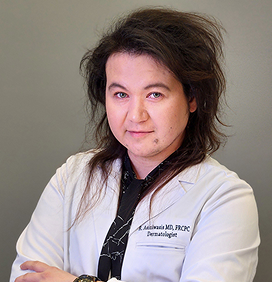Atopic dermatitis (AD), also known as atopic eczema, is the most common and most burdensome skin disorder in the world and is strongly connected to asthma and allergies. Suffering with AD throughout life is now known to be common, and adults often have more severe skin inflammation and more changes to blood immune cells. The reasons why are unclear, but one-tenth of adults develop AD late in life, so environmental factors may play a large role. Evidence for such culprits is strongest for the bacteria Staphylococcus aureus (staph). Commonly found in our noses, staph can cause serious infections; in AD skin, it is usually present. More staph growth associates with more severe disease and coincides with flares. We don’t understand how this bacterium interacts with the skin immune system in AD; this, together with missing information on genetic factors, needs substantial research. Collaborative research teams with broad expertise must also integrate patient experience and knowledge, especially when considering resistance to treatment. Our proposed team has the largest Canadian adult AD database and biobank, and aims to share specimens, protocols, and management infrastructure, along with digital tools. Our aim is to work together to promote long-term remission of disease.
project details
Canadian Patient-Oriented Dermatitis database and biobank (C-POD)
McGill University
5 Sites
ON, QC, BC

Dr. Carolyn Jack
Position: Member
view our other projects

East-West national Indigenous atopic dermatitis community and research collaborative core seed working group
First Nations University of Canada
4 Sites
SK, QC, MB

Surgical management of hidradenitis suppurativa with deroofing vs wide local excision: a multi-centre retrospective cohort study
University of Toronto, Women’s College Hospital
4 Sites
ON, QC, BC, AL

Establishing a National Registry and Biobank for Hereditary Leiomyomatosis and Renal Cell Cancer (HLRCC)
McGill University Health Centre
5 Sites
QC, ON, BC

The Development of a Psychodermatology Risk Assessment Tool: Improving Care for Patients with Atopic Dermatitis and Other Psychodermatologic Conditions
The University of Alberta, Kaye Edmonton Clinic
2 Sites
AL, QC

Autoinflammatory Skin Diseases – Creation of a Canadian Network (skinSAIDcanada)
Université de Montreal
4 Sites
ON, BC, AL, QC

Canadian Atopic dermatitis Cohort for Translational Immunology and imaging (CACTI) BRONTE trial (BROadband vs Narrowband phototherapy for eczema)
Women’s College Hospital
3 Sites
ON, QC, BC

Setting up the conditions for the biobanking of tissues and cells from hypertrophic scars
Université Laval
2 Sites
MB, QC

Hidradenitis Suppurativa in Diverse Patient Populations: Multicenter Pilot Project to Assess Disease Characteristics and Access to Biologic Therapy
Sunnybrook Research Institute
7 Sites
MB, QC, ON





















